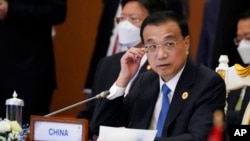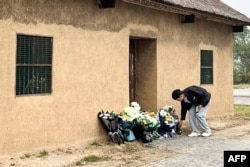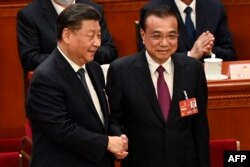The legacy of former Premier Li Keqiang, once considered a potential contender for the Chinese presidency, is seen as a lost opportunity for major economic reform by some analysts who describe him as an economics expert with little power to manage economic affairs.
“He was the most educated Chinese premier, as he held a Ph.D. in economics from Peking University, but as a premier, he was given very little power over economic affairs,” Chang Wu-ueh, an expert on Chinese politics at Tamkang University in Taiwan, told VOA by phone.
“While Li was supposed to be in charge of economic affairs as the Chinese premier, over the last 10 years, all major economic decisions in China were made by [Chinese President] Xi Jinping,” he said.
Li was the Chinese premier and head of China’s state council from 2013 to 2023, the first decade of Xi’s tenure. He was replaced by Li Qiang, former party secretary in Shanghai and a Xi loyalist, in March after the National People’s Congress.
The official announcement released by China’s state broadcaster CCTV said Li experienced a “sudden heart attack” October 26 while resting in Shanghai. He died 10 minutes after midnight on October 27 following “all-out efforts to revive him.”
During his time as premier, China experienced growing economic challenges, including rising trade tensions with the United States, increasing government debt and unemployment and the serious economic slowdown caused by the COVID-19 pandemic. Despite the multitude of challenges, Li continued to support efforts to stabilize the economy and increase employment in China.
While some reformers in the Chinese Communist Party, or CCP, had expected Li to continue the momentum of economic reforms carried out by predecessors Zhu Rongji and Wen Jiabao, Li was gradually sidelined as Xi tightened control over the party.
“Xi played a more hands-on role in decision-making, including in the economic and financial realms, so at the end of the day, Xi seems to have played a greater influence on even matters like economics, which is traditionally considered a sphere of influence of premiers,” Wen-ti Sung, a political scientist at Australian National University, told VOA by phone.
Sung said Li’s diminished role and influence in the Chinese political system can be seen through state media reports. In 2013, state media referred to the era as “the Xi-Li era,” which followed the tradition of highlighting the delicate power dynamic between the party general secretary and the premier.
In recent years, though, state media have normally used “Xi Jinping’s New Era” for this period of time.
“I think that’s a straightforward indicator of how the power of the general secretary has grown significantly across all areas of Chinese governance, including over economic policy, and that contributes to how Li might not have played as deterministic a role on economic policy as past premiers had,” Sung said.
“Frustrated reformer”
Li, who held degrees in law and economics, was seen as friendly to the private sector and a would-be deep reformer whose attempts to initiate changes to China’s economic policies largely failed to materialize.
During his tenure, “there was constant talk about reforming the land system in China’s countryside, which would be a key reform that allowed rural people to monetize their land and let people in the countryside start to get richer,” said Dexter Roberts, the director of China Affairs at the University of Montana’s Mansfield Center.
Roberts said that in the later stage of his premiership, Li began focusing on pushing economic reforms that did not have a huge effect on the Chinese economy.
“In his latter years, Li Keqiang started talking about things like cutting red tape and reducing the number of administration regulations, which seemed to me like real serious reforms were not going to be possible,” he told VOA by phone.
In addition to minor reforms with limited impact on the Chinese economy, Roberts said, Li also championed the idea that entrepreneurship and innovation were the new growth engine. While premier, Li vowed to improve conditions for entrepreneurs, but in recent years, China has tightened control over technology and other industries and instituted laws deemed unfriendly to foreign businesses.
“I feel like Li was led into pushing these things that were not significant economic reforms simply because he didn't have the power to do that under Xi Jinping. He was a frustrated reformer,” Roberts said.
Advocate for the have-nots
Unlike Xi, who was from a prominent Communist Party family, Li rose through the ranks of the party’s Youth League, which was known for producing reform-minded political figures from humble family backgrounds. The faction was an important power base for former Chinese President Hu Jintao.
Sung said Li distinguished himself as someone who paid attention to livelihood issues for the “have-nots.”
“In a way, he is a little bit more down-to-earth compared to others in the Chinese leadership,” he told VOA.
Some on the Chinese social media platform Weibo expressed condolences to “the good premier who devoted himself to the people,” while others said they have always “loved and respected” Li.
“He will be remembered as an advocate for the freer market and for the have-nots,” Sung said.
In 2020, Li famously said that 600 million people in China earned less than the equivalent of $140 a month, generating widespread debates about poverty and income inequality in China.
Despite his lack of real achievement as premier, Li did have a lasting impact on how the world interprets China’s economic activities. In a U.S. diplomatic cable leaked by Wikileaks in 2010, Li, who was the party chief in Liaoning province, said in 2007 that China’s GDP numbers were “man-made” and “unreliable.”
This comment led to the emergence of alternative ways to interpret Chinese economic activities, and some have characterized these measures as “Likonomics.”
Li’s death comes as China struggles to cope with a persistent economic slump extended by the three-year COVID-19 pandemic and rising tensions with the West.
As the world awaits Li’s official CCP-sanctioned obituary, which is likely to define his legacy, Chang said he thinks his death will have a limited impact on Chinese society and Xi’s control over China.
While the deaths of top Chinese officials have triggered public demonstrations in the past, Chang said it is unlikely Li’s death will lead to any opposition to Xi.
“The Chinese government will tolerate some public mourning and tribute to Li, but his death will not have much impact on China’s political leadership and Xi Jinping’s interests,” he told VOA.






